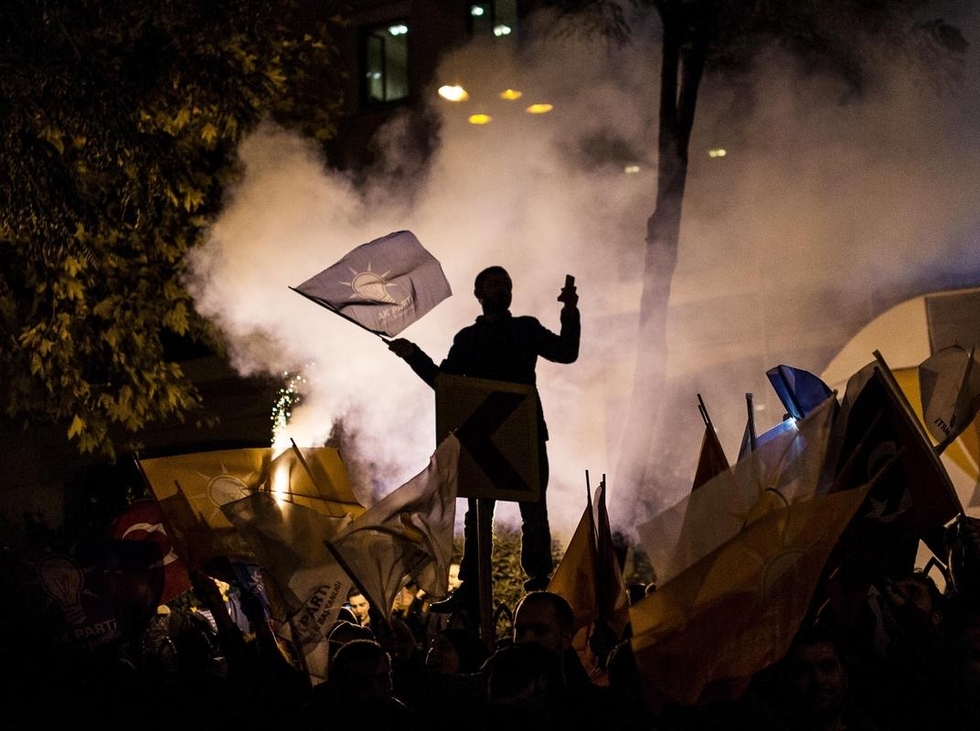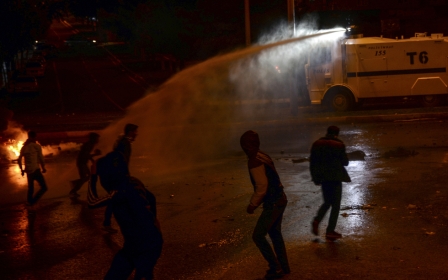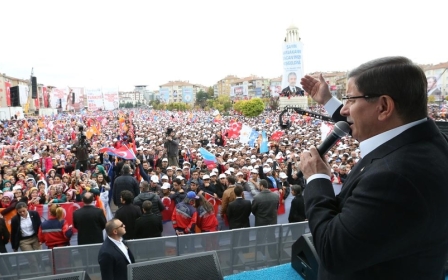Fear, violence and desire for stability hand AKP victory

After elections, money markets are sometimes the best political barometers. On Monday, the Turkish Lira leapt by 3 percent against the US dollar as the markets opened. A new period of stable single-party rule is opening in Turkey after five months of uncertainty and violence following the deadlock in the June general elections.
But while the economic outlook may have improved, Turks are coming to terms with a political earthquake which leaves President Erdogan and the ruling Justice and Development Party (AKP) of his lieutenant, Prime Minister Ahmet Davutoglu, vastly strengthened and the opposition in pieces.
Instead of the renewed deadlock predicted by most, though not all opinion polls, the AKP surged to victory, picking up a comfortable majority of around 40 extra seats, 23.4 million votes (the largest number ever) and 49 percent of the votes - nine percentage points up on the June result.
These results are only provisional figures from the media and political parties. Just three hours after the election closed on Sunday, with nearly all the votes counted astonishingly fast nationwide, the High Election Council (YSK), the regulating authority, closed its news site, which gives the formal results and has not reopened it since, despite many requests on social media. Its chief says the final official results will be available in 10 days or so.
How did the AKP stage its triumphant comeback? Its opponents claim it created a climate of fear by ending the ceasefire with the Kurdish PKK and so triggering an avalanche of terrorism and counter-attacks and then told the country that this was the result of the failure to give it a majority. A vote for it would bring back peace, while a vote for the opposition might mean continued deadlock and even a third general election to resolve it.
Others point to the curbs on press and media freedom this summer. Just four days before the elections, courts were ordering the instant takeover of an opposition newspaper and television station loyal to the 74-year old exiled Sufi cleric, Fethullah Gulen, who lives in the United States but is wanted in Turkey for alleged terrorist charges. Gulen is generally regarded as having been behind an attempt to unseat Erdogan in December 2013 through serious corruption charges. These were later quashed and last night’s result means that no more will be heard of them.
But there are also more practical reasons behind the AKP’s victory. It followed classical modern party political campaign tactics, concentrating on marginal seats, trying to expand its following in areas which were already sympathetic to it. Even in its own heartland provinces there was a strong swing to it.
By comparison, the two larger opposition parties ran feeble campaigns which amounted to a few posters and some TV advertising. Canvassing, leafleting and the other hallmarks of an election campaign seem to be something that they don’t do - despite massive annual government subsidies in the budget. Because of the climate of violence they also cut down on their traditional main activity, election rallies. They failed both to press their opposition to the AKP and its authoritarian style of rule or to show how they would actually run the country (apart from some rather obvious campaign ploys such as extravagant promises to subsidise fuel).
For the CHP, the centre-left main opposition party, the result is not a direct catastrophe. It picked up a meager 100,000 extra votes and about 0.4 percent of the poll, but it will continue to enjoy the subsidy income (US$56 million in 2015) which gives it a towering headquarters building in Ankara that dwarfs Western European party HQs actually in power. It will also probably continue to be a party which looks inward and seems often to cold-shoulder new blood.
The rightist MHP (Nationalist Action Party) which is the main rival of the AKP in central Anatolia but stoutly refused either to go into coalition with it or to join forces with the rest of the opposition, has paid for its intransigence by losing 2 million votes (presumably mostly to the AKP) and its parliamentary representation has slumped to an anticipated 40 seats compared to 80 in the short-lived last assembly. Despite this there seems to be little question of a change of leadership.
Its members are now likely to be wooed by the AKP as it attempts to find the extra votes it needs in the assembly to move towards changing the constitution and making President Erdogan officially an executive president - though in practice he is pretty much that already.
The greatest battering was taken by the pro-Kurdish HDP (Peoples’ Democratic Party) as it slipped tantalisingly close to the 10 percent barrier, emerging eventually just 0.4 percent above it. But, because of its concentrated geographical support base, it will have about 59 seats, putting it ahead of the MHP and making it Turkey’s third largest party. But somehow it lost 1.3 million voters, presumably Kurds who decided to return to the AKP.
It too could now face approaches from the AKP to cut a deal with it over constitutional changes - something to which the party’s co-chairman, Selahattin Demirtas, is vehemently opposed. This idea collapsed last spring. The problem in reviving it would be that the Kurds would expect some measure of real autonomy, something the AKP is unlikely to concede.
As for the AKP’s priority, it has already indicated that its first goal is to change the constitution, something which is still arithmetically quite difficult. President Erdogan also indicated before the elections several times that the drive against the Gulen movement will continue. It has also to carry on with the fight against the PKK, whose militants may have had their hand strengthened by the poor showing of the HDP, as well as ISIL. Opposition media groups such as Zaman and the Dogan Media Group are likely to face a further squeeze.
Internationally, although President Erdogan seems to have felt the world media was against the AKP, the EU has reacted positively to the AKP victory, indicating that it enables the union to work more closely with Turkey. It has already signalled that it does not want to press human rights criticism, pragmatic recognition perhaps that the AKP is here to stay.
- David Barchard has worked in Turkey as a journalist, consultant, and university teacher. He writes regularly on Turkish society, politics, and history, and is currently finishing a book on the Ottoman Empire in the 19th century.
The views expressed in this article belong to the author and do not necessarily reflect the editorial policy of Middle East Eye.
Image: Supporters of Turkey's Justice and Development (AK) Party gather for a celebration as general election results close to conclude in Istanbul, Turkey on 2 November, 2015. (AA)
New MEE newsletter: Jerusalem Dispatch
Sign up to get the latest insights and analysis on Israel-Palestine, alongside Turkey Unpacked and other MEE newsletters
Middle East Eye delivers independent and unrivalled coverage and analysis of the Middle East, North Africa and beyond. To learn more about republishing this content and the associated fees, please fill out this form. More about MEE can be found here.





